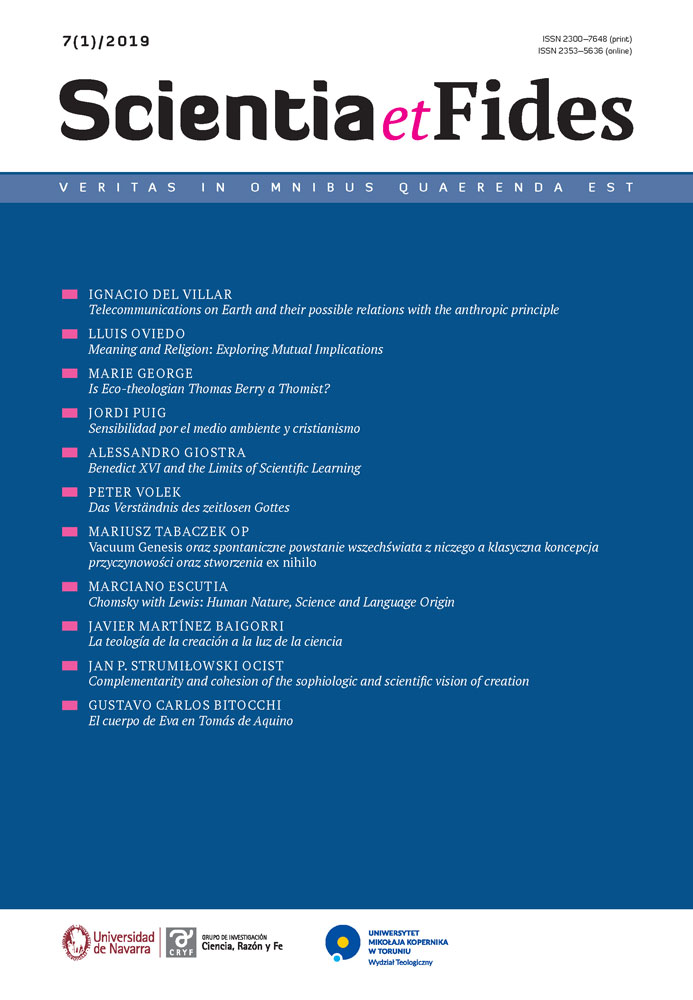Benedict XVI and the Limits of Scientific Learning
Keywords
Ratzinger, science, faith, epistemology, metaphysicsAbstract
In a scientific context such as ours, a true understanding of faith needs a correct approach to its relationship with science. Defending religious belief in the modern age dominated by scientific learning is the main preoccupation expressed by Pope Benedict XVI in some of his own speeches. Tackling this task means changing the nature of our ideas on both science and faith. The belief in God is compatible with science, only if we demarcate the limits of the scientific discourse. The idea that science is the framework for all kinds of cultural inquiry proves incorrect and represents a considerable risk for humanity. Moreover, a naturalist approach cannot respond to the exigency of finding a more profound meaning in natural reality.
References
Galilei, Galileo. 2012. Selected Writings. Translated by William Shea and Mark Davies. Oxford: Oxford University Press.
Gilson, Etienne. 1959. Elements of Christian Philosophy. Garden City: Doubleday.
Haught, John. 2006. Is Nature Enough? Meaning and Truth in the Age of Science, Cambridge: Cambridge University Press.
Husserl, Edmund. 1970. The Crisis of European Sciences and Transcendental Phenomenology. Evanston: Northwestern University Press.
Jaki, Stanley. 1996. Bible and Science. Front Royal: Christendom Press.
Jaki, Stanley. 2000. The Savior of Science. Grand Rapids: Eerdmans Publishing Company.
Jaki Stanley. 2007. The Ethical Foundations of Bioethics. Port Huron: Real View Books.
Jaki, Stanley. 2009. The Mirage of Conflict between Science and Religion. New Hope: Real View Books.
Laplace, Pierre Simon. 1902. A Philosophical Essay on Probabilities. Translated by Frederick Wilson Truscott. New York: Robert Drummond Printer.
Ratzinger, Joseph. 2010. Fede e Scienza: Un Dialogo Necessario. Torino: Lindau.
Ratzinger, Joseph. Speeches. https://w2.vatican.va/content/benedict-xvi/en/speeches.index.html#speeches
Szetela, Monika, and Grzegorz Osiński. 2017. “The Concept of ‘Dialogical Soul’ by Joseph Ratzinger against the latest concepts of neuroscience”. Scientia et Fides 5, n. 2: 199–215.
Downloads
Published
How to Cite
Issue
Section
License
CC BY ND 4.0. The Creator/Contributor is the Licensor, who grants the Licensee a non-exclusive license to use the Work on the fields indicated in the License Agreement.
- The Licensor grants the Licensee a non-exclusive license to use the Work/related rights item specified in § 1 within the following fields: a) recording of Work/related rights item; b) reproduction (multiplication) of Work/related rights item in print and digital technology (e-book, audiobook); c) placing the copies of the multiplied Work/related rights item on the market; d) entering the Work/related rights item to computer memory; e) distribution of the work in electronic version in the open access form on the basis of Creative Commons license (CC BY-ND 3.0) via the digital platform of the Nicolaus Copernicus University Press and file repository of the Nicolaus Copernicus University.
- Usage of the recorded Work by the Licensee within the above fields is not restricted by time, numbers or territory.
- The Licensor grants the license for the Work/related rights item to the Licensee free of charge and for an unspecified period of time.
FULL TEXT License Agreement
Stats
Number of views and downloads: 814
Number of citations: 2



